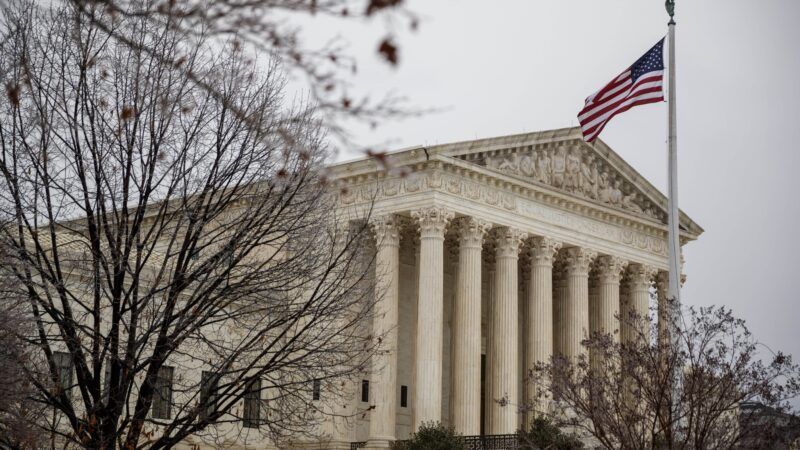A Prison Guard Who Pepper-Sprayed an Inmate Without Provocation Got Qualified Immunity. SCOTUS Disagreed.
An encouraging sign from the Supreme Court

The Supreme Court on Monday dealt another blow to qualified immunity, the legal doctrine that shields civil servants from accountability for alleged misconduct.
It's a stark change from this time last year. In February 2020, the U.S. Court of Appeals for the 5th Circuit awarded qualified immunity to a correctional officer who pepper-sprayed an inmate without provocation. It was that decision—McCoy v. Alamu—that the justices reversed yesterday and remanded back to the lower court for reconsideration.
Their move is subtle and went unnoticed by just about every major news outlet. It doesn't alter the legal doctrine itself. But it does gesture to the lower courts that they should hold state actors to a higher standard—a welcome change in qualified immunity jurisprudence.
The decision invokes another Supreme Court ruling in a recent case: Taylor v. Riojas, in which several prison guards were originally given qualified immunity, also by the 5th Circuit, after locking a naked inmate in two squalid cells, one covered with "massive amounts" of human feces and the other filled with raw sewage. In November, the justices reversed that and wrote in an unsigned opinion that "no reasonable officer" would think placing an inmate in such conditions was constitutional. It was the first time the high court had rejected a qualified immunity defense since 2004.
In discussions around qualified immunity, reasonable is the operative word. Would a reasonable state actor know that their conduct was wrong? To find out, courts are to consider two prongs: whether an offense was unconstitutional, and whether or not it was "clearly established" in a previous court precedent that said the offense was unconstitutional, such that the offending party would have notice.
In practice, however, the doctrine has emboldened many unreasonable officials doing unreasonable things, like the cops who stole $225,000 while executing a search warrant, or the cop who shot a 10-year-old child while aiming at a nonthreatening dog. Though it might appear obvious to a bystander that such conduct infringed on the victims' rights, they were not afforded the privilege to sue, because no previous court rulings outlined the situations in question with near-exact detail.
McCoy presented a similar dilemma. The guard, referred to in the decision as Mr. Alamu, allegedly pepper-sprayed an inmate, Prince McCoy Jr., after a different prisoner threw water on Alamu. That prisoner then shielded the front of his cell with bedding so that he was unreachable when Alamu returned. Frustrated, he instead attacked McCoy, who was housed in a neighboring cell. After an internal investigation, Alamu was found to have violated policy and was placed on a three-month probation.
He also violated McCoy's Eighth Amendment rights to be free from cruel and unusual punishment, the 5th Circuit said. But it wasn't clearly established that it was a violation, so, again, the victim was told that any civil suit against Alamu would be discarded.
"We held that the spraying crossed that line," wrote Circuit Judge Jerry E. Smith. "But it was not beyond debate that it did, so the law wasn't clearly established."
The decision epitomizes broken logic. "It really indicates the level of granularity that courts go into in order to figure out whether or not qualified immunity applies or not," Anya Bidwell, an Institute for Justice attorney, tells Reason. "They don't just look at broad principles of the law. They're looking at factual distinctions, like whether an inmate was pepper-sprayed versus whether an inmate was tased."
Such granularity also defined the 5th Circuit's original ruling in Taylor. Though the judges conceded that the guards' actions—sticking an inmate in two deplorably filthy cells—were unconstitutional, it was not clearly established that they were unconstitutional. That opinion, likewise penned by Smith, noted that although the guards' behavior was cruel and unusual, they could not be held accountable because the prisoner only suffered in those circumstances for six days—a timeframe that had not yet been ironed out explicitly in prior case law.
"The Supreme Court has repeatedly admonished courts not to define the relevant law too capaciously," Smith wrote last year. But it was the Supreme Court that overturned both of his recent qualified immunity rulings, telling the 5th Circuit on Monday to specifically rethink McCoy in light of their reversal in Taylor.
In some sense, however, Smith isn't wrong; the high court has indeed demanded a ridiculous standard for overcoming qualified immunity in past terms, and last year they declined several opportunities to reconsider the doctrine. And while they still seem hesitant to alter qualified immunity itself, the decision yesterday indicates a potential change in justices' opinions about just how hard they should make it for the public to hold civil servants accountable.
"There is a pattern developing, where the Court is signaling very strongly to the lower courts…that certain actions by government officials are obviously wrong, and that any reasonable official would have known," says Bidwell.
Show Comments (17)